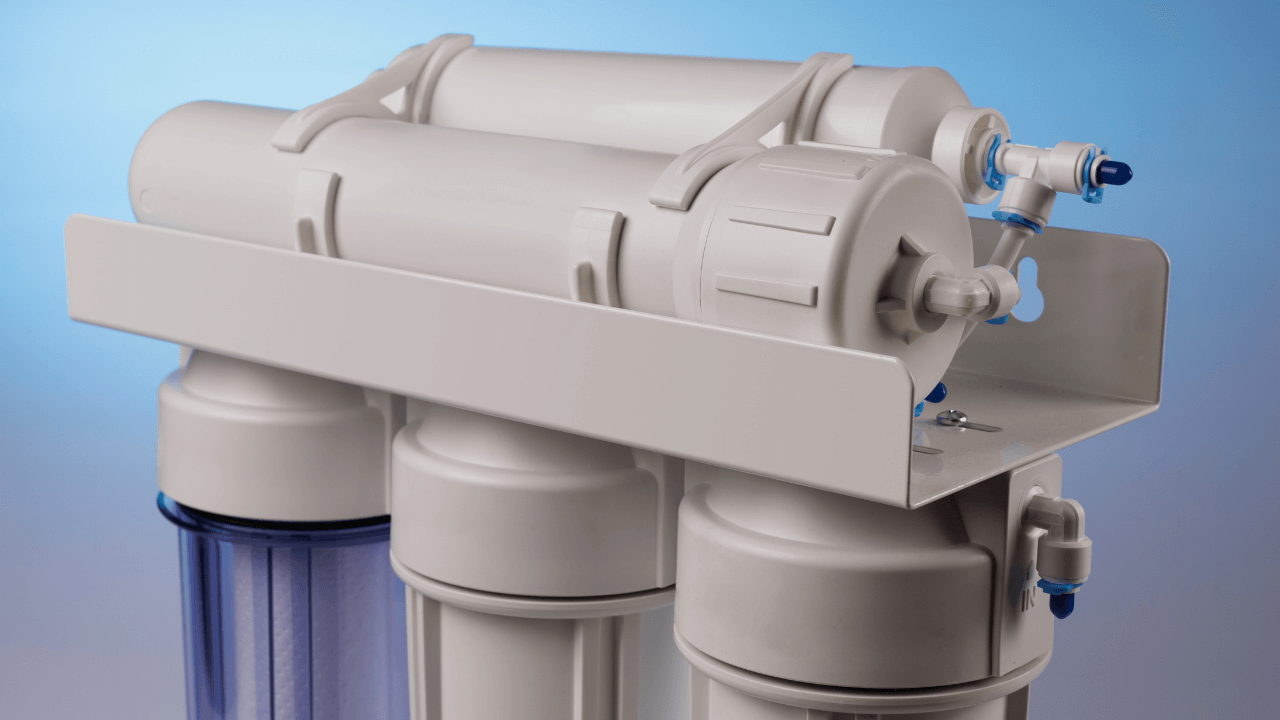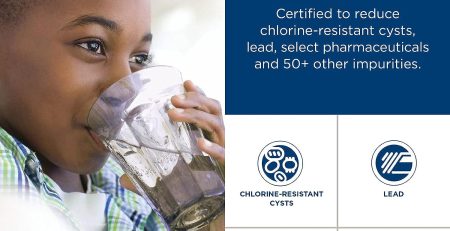How Refrigerator Filters Can Help You Avoid the Dangers of Teflon Toxins?
In today’s world, where industrial chemicals are increasingly present in our environment, ensuring the safety of your drinking water has become paramount. Among the various pollutants that can contaminate water, Teflon toxins have garnered significant attention due to their potential health risks. These toxins, primarily associated with per- and polyfluoroalkyl substances (PFAS), can enter the water supply and pose serious dangers if consumed over time.
Investing in a reliable refrigerator filter is one of the most effective ways to safeguard your family against these harmful substances. Whether you’re using a Kenmore refrigerator filter, EveryDrop water filter, or GE MWF filter, a quality filter can significantly reduce the presence of Teflon toxins in your drinking water. In this article, we will explore the dangers of Teflon toxins, how they can contaminate your water supply, and how refrigerator filters can help you avoid these risks.
Understanding Teflon Toxins: What Are They?
- The Origin of Teflon Toxins
Teflon, a brand name for polytetrafluoroethylene (PTFE), is a chemical compound widely used for its non-stick properties, particularly in cookware. However, the manufacturing process of Teflon and similar products involves the use of per- and polyfluoroalkyl substances (PFAS), which are a group of man-made chemicals. PFAS have been used in various industries since the 1940s due to their water- and grease-resistant properties.
While PTFE itself is stable and not harmful when used properly, the production and degradation of PFAS can release toxic byproducts into the environment. These chemicals are incredibly persistent, earning them the nickname “forever chemicals,” as they do not break down easily and can accumulate in the environment and human body over time.
- The Dangers of PFAS Contamination
PFAS contamination has become a significant environmental and public health concern. Studies have linked long-term exposure to PFAS to a range of serious health problems, including:
- Cancer: Certain PFAS have been associated with an increased risk of kidney and testicular cancer.
- Hormonal Disruption: PFAS can interfere with hormonal systems, leading to reproductive and developmental issues.
- Immune System Suppression: Exposure to PFAS has been shown to reduce immune system function, making individuals more susceptible to infections and illnesses.
- Liver Damage: PFAS can accumulate in the liver, leading to liver damage and increased cholesterol levels.
- Developmental Issues in Children: Children exposed to PFAS may experience developmental delays, reduced birth weight, and other growth issues.
Given these risks, reducing exposure to PFAS, particularly through drinking water, is crucial for maintaining good health.
How Do Teflon Toxins Enter the Water Supply?
- Industrial Discharge and Environmental Contamination
One of the primary sources of PFAS contamination in water is industrial discharge. Factories that produce or use PFAS in manufacturing processes can release these chemicals into nearby water bodies, contaminating both surface water and groundwater. Once PFAS enter the water supply, they can spread over large areas, affecting entire communities.
- Household Sources of PFAS
In addition to industrial sources, PFAS can also be found in everyday household items. Products like stain-resistant fabrics, water-repellent clothing, food packaging, and even certain types of fire-fighting foam contain PFAS. Over time, these chemicals can leach into the environment and eventually make their way into the water supply.
- Degradation of Non-Stick Cookware
Non-stick cookware, often coated with Teflon, can degrade over time, especially when exposed to high heat. This degradation can release small amounts of PFAS, which may enter the water system through various means, including improper disposal of cookware or direct contamination during dishwashing.
The Role of Refrigerator Filters in Removing Teflon Toxins
- How Refrigerator Filters Work
Refrigerator water filters are designed to remove a wide range of contaminants from your drinking water, including heavy metals, chlorine, and certain chemicals. Most high-quality filters, like the EDR4RXD1 and MWF filter, use activated carbon as the primary filtration medium. Activated carbon is highly effective at adsorbing organic chemicals, making it an excellent choice for filtering out PFAS.
When water passes through the activated carbon filter, the carbon’s porous structure traps contaminants, preventing them from reaching your drinking water. Filters like the GE MWF water filter and EveryDrop water filter are specifically designed to reduce the presence of various harmful substances, including Teflon toxins.
- The Effectiveness of Refrigerator Filters Against PFAS
While not all refrigerator filters are certified to remove PFAS, many high-quality filters can reduce their presence in your water supply. Filters like the Kenmore refrigerator filter and EDR1RXD1 are known for their ability to remove or reduce a wide range of contaminants, including volatile organic compounds (VOCs), pesticides, and industrial chemicals like PFAS.
The effectiveness of a refrigerator filter in removing PFAS depends on several factors, including the type of filter, the specific contaminants in your water, and the concentration of PFAS. However, using a filter that is designed to reduce these toxins can significantly lower your exposure to harmful chemicals in your drinking water.
Key Benefits of Using Refrigerator Filters to Avoid Teflon Toxins
- Healthier Drinking Water
The most significant benefit of using a refrigerator filter is the health protection it offers. By reducing the presence of PFAS and other harmful chemicals in your water, you can lower the risk of developing health issues associated with these toxins. Filters like the WF3CB and ADQ36006101 are designed to ensure that the water you drink is as clean and safe as possible.
- Improved Taste and Odor
In addition to removing harmful contaminants, refrigerator filters also improve the taste and smell of your drinking water. Chemicals like chlorine, which are commonly used in municipal water treatment, can leave an unpleasant taste and odor. By using a filter like the W10295370, you can enjoy better-tasting water that is free from unwanted chemicals and odors.
- Convenience and Accessibility
Refrigerator filters offer a convenient way to access clean, filtered water directly from your fridge. With filters like the EDR3RXD1 or Kenmore refrigerator filter, you have a continuous supply of filtered water and ice at your fingertips. This convenience makes it easy to ensure that your family is drinking safe, clean water every day.
- Cost-Effective Solution
Investing in a refrigerator filter is a cost-effective way to ensure the quality of your drinking water. Compared to the cost of purchasing bottled water or installing a whole-house filtration system, refrigerator filters provide an affordable solution for reducing contaminants in your water supply. Filters like the GE MWF filter and EveryDrop water filter offer long-lasting performance, typically needing replacement only every six months.
Choosing the Right Refrigerator Filter for PFAS Removal
- Compatibility with Your Refrigerator
Before purchasing a refrigerator filter, it’s essential to ensure that it is compatible with your refrigerator model. Different filters are designed for specific refrigerator brands and models, so be sure to check your refrigerator’s manual or model number. Filters like the Kenmore refrigerator filter and GE MWF filter are designed to fit specific brands, providing optimal filtration for those models.
- Filtration Capabilities
When choosing a refrigerator filter, consider its filtration capabilities, particularly its ability to remove PFAS and other harmful chemicals. Look for filters that are certified by organizations like NSF International, which test and certify products for their ability to reduce specific contaminants. Filters like the EDR4RXD1 and MWF water filter are NSF certified and designed to reduce a wide range of harmful substances.
- Filter Lifespan and Replacement
Refrigerator filters need to be replaced regularly to maintain their effectiveness. Most filters, including the WF3CB and ADQ36006101, have a lifespan of about six months, depending on usage and water quality. Regularly replacing your filter ensures that it continues to remove contaminants effectively, providing your family with safe, clean water.
Maintaining Your Refrigerator Filter for Optimal Performance
- Regular Replacement
To ensure your refrigerator filter continues to perform effectively, it’s crucial to replace it according to the manufacturer’s recommendations. Most filters should be replaced every six months, but this can vary based on usage and water quality. If your refrigerator has a filter replacement indicator, be sure to follow its guidance.
- Proper Installation
Proper installation is key to ensuring that your refrigerator filter works as intended. Follow the manufacturer’s instructions carefully when installing a new filter. Improper installation can lead to leaks, reduced filtration efficiency, and potential contamination of your water supply.
- Monitoring Water Quality
Even with a high-quality filter in place, it’s important to monitor the quality of your water regularly. If you notice any changes in taste, odor, or appearance, it may indicate that your filter needs to be replaced or that there is a problem with your water supply. Consider using a water testing kit to check for contaminants and ensure that your filter is working effectively.
The Long-Term Health Benefits of Using Refrigerator Filters
- Reducing Exposure to Harmful Chemicals
By using a refrigerator filter to remove Teflon toxins and other harmful chemicals from your water, you can significantly reduce your family’s exposure to these substances. This reduction in exposure can lower the risk of developing chronic health conditions associated with PFAS and other contaminants, providing long-term health benefits.
- Supporting Environmental Health
In addition to protecting your family’s health, using a refrigerator filter can also contribute to environmental health. By reducing the demand for bottled water, you can decrease plastic waste and reduce the environmental impact of plastic production and disposal. Filters like the EDR1RXD1 and GE MWF filter offer a sustainable alternative to bottled water, helping to protect the environment for future generations.
Conclusion: Protecting Your Family with Filter For Fridge
As awareness of the dangers of Teflon toxins and other environmental contaminants grows, taking proactive steps to protect your family’s health has never been more important. By investing in a high-quality refrigerator filter from Filter For Fridge, you can ensure that your drinking water is free from harmful chemicals, including PFAS.
Whether you’re using a Kenmore refrigerator filter, EveryDrop water filter, or GE MWF filter, these filters provide an effective, convenient, and cost-efficient solution for improving the quality of your drinking water. Regular maintenance and replacement of your filter will ensure long-lasting performance and peace of mind, knowing that your family is protected from the dangers of Teflon toxins.
Filter For Fridge offers a wide range of refrigerator filters designed to fit various brands and models, providing you with the best protection against water contaminants. Prioritize your health and the health of your loved ones by choosing a reliable refrigerator filter today.





